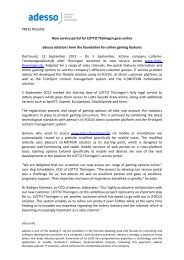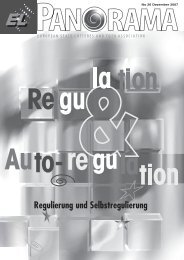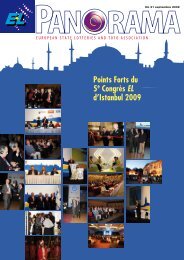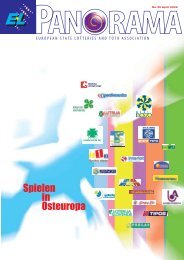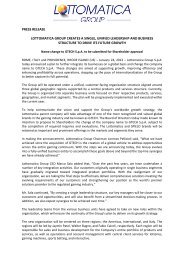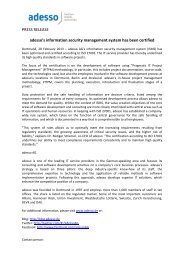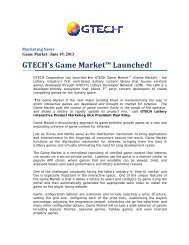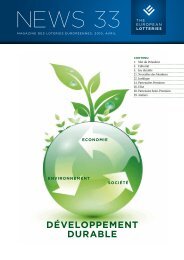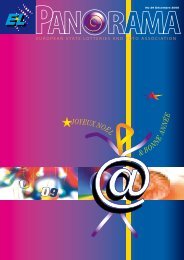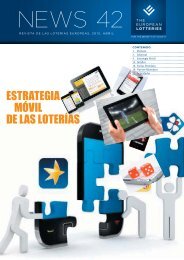MAGAZINE OF THE EUROPEAN LOTTERIES, 2011, SEPTEMBER ...
MAGAZINE OF THE EUROPEAN LOTTERIES, 2011, SEPTEMBER ...
MAGAZINE OF THE EUROPEAN LOTTERIES, 2011, SEPTEMBER ...
Create successful ePaper yourself
Turn your PDF publications into a flip-book with our unique Google optimized e-Paper software.
FUTURE & CHALLENGES<br />
Fromitsside,theEuropeanCommission<br />
is opposing against Member State<br />
requirement to have technology<br />
systems location (server, frontal server,<br />
portal with ISP blocking…).<br />
The Commission has however no<br />
arguments to oppose against the<br />
positionoftheMemberStates.Moreover,<br />
in the secondary legislation, as in the<br />
AML directive, onsite inspections are<br />
foreseen as necessary requirement for<br />
the prevention and enforcement of<br />
Money Laundering (even though, for<br />
now, still only applicable to the casino<br />
game sector).<br />
Therefore, there is an urgent need for a<br />
very substantial debate among different<br />
stakeholders to find out which could be<br />
a proper environment to enable proper<br />
IT standards supporting the Member<br />
States policies.<br />
The gaming industries should focus<br />
on player protection and contribution<br />
to the society and therefore can only<br />
welcome that investigation on gambling<br />
technology will take place.<br />
In fact, only the cooperation among the<br />
stakeholders could lead to the definition<br />
of effective technical requirements and<br />
solutions.<br />
The current EU Regulatory and<br />
Legislative framework, as clarified by<br />
the Court of Justice of the EU and by<br />
a number of secondary EU legislative<br />
instruments, must form the backdrop<br />
to the discussion on the design of the<br />
gambling technology.<br />
What does it mean in practice for<br />
operators and different stakeholders?<br />
There is a need to discuss on how to<br />
get control over the expanding online<br />
market by adapting to the changing<br />
environment throughout a strongly<br />
regulated controlled expansion policy,<br />
by exploring new form of games and<br />
new form of distribution tools as long as<br />
the illegal market continues to flourish.<br />
The debate on gambling technology<br />
will have mainly to focus on defending,<br />
also legally, the market by mean of<br />
enforcement through ISPs, payment<br />
blocking, geo-location technology;<br />
researching & comparing what other<br />
industries set up (i.e. the music industry<br />
against illegal downloading) or the<br />
social media which have succeeded<br />
in offering and disseminating<br />
(notwithstanding the serious privacy<br />
implications) the use of Geolocation as<br />
commercial tool.<br />
A first step could be the exchange<br />
of views and information among<br />
stakeholders from the different<br />
Member States on the different IT tools,<br />
especially on key issues such as: server<br />
and cloud based technology, liquidity<br />
& open end white labels, consumer<br />
E-identification(government practices),<br />
consumer behavior tracking, controls<br />
and responsible gaming, online<br />
payment services, Money Laundering<br />
and “know your customer” tools,<br />
Mobile phones technology, ….<br />
Still many questions remain open as we<br />
move forward:<br />
How to define the standards for<br />
transnational (or if necessary also<br />
international) issues? How can the<br />
technical knowledge and expertise<br />
easily be acquired? How practical and<br />
effective are IP and Payment blocking<br />
systems? What data protection features<br />
to be put in place? How should facilities<br />
such as random number generator<br />
and other “gaming machine” features<br />
LEGAL<br />
19 NEWS 37 <strong>SEPTEMBER</strong> <strong>2011</strong><br />
be best regulated? Where do servers<br />
or other IT hardware be located to<br />
guarantee the regulatory control? What<br />
e-ID systems can be promoted?<br />
The list is long and will require different<br />
experts to talk to each other. The EU<br />
Commission does not know the answer,<br />
but is certainly willing to learn from<br />
the sector what tools are available and<br />
can help to find answers to get control<br />
over the online market. By organizing<br />
an innovation meeting involving legal,<br />
IT, security and marketing experts and<br />
suppliers, EL has taken the first step in<br />
this direction.<br />
Philippe Vlaemminck<br />
EL Legal Adviser




